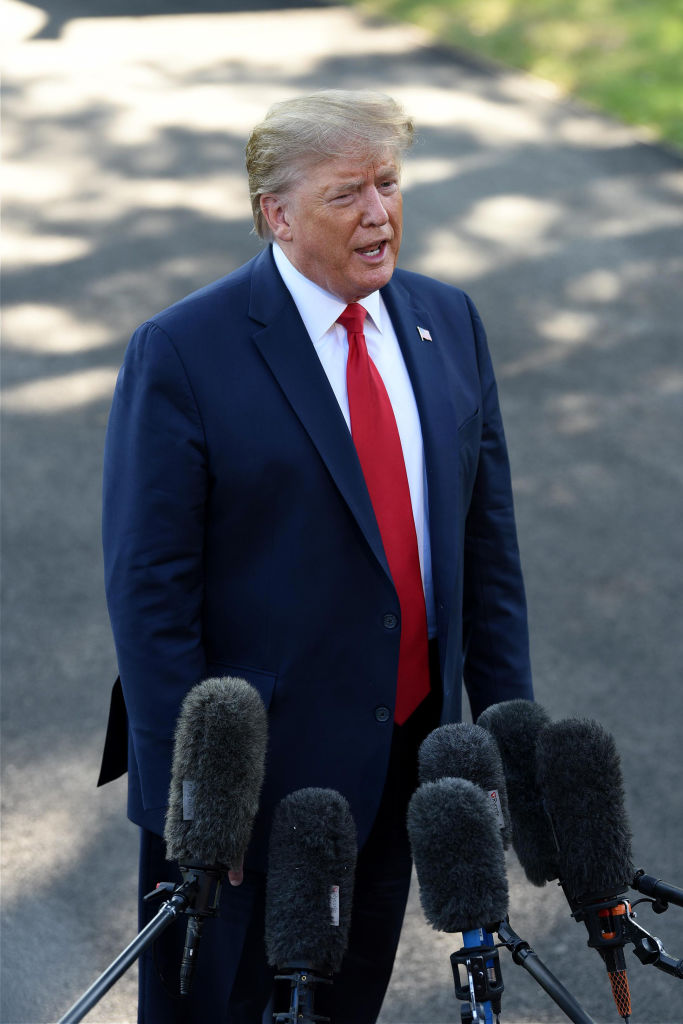
(Bloomberg) –– U.S. President Donald Trump ordered tighter sanctions on Iran days after strikes on Saudi Arabia’s biggest oil installation rattled energy markets and raised the specter of a slide toward regional war.
“I have just instructed the Secretary of the Treasury to substantially increase Sanctions on the country of Iran!” Trump said in tweet.
Trump didn’t say what the new measures may involve. The U.S. has already imposed sweeping sanctions on much of Iran’s economy — especially its oil sales — since exiting the landmark 2015 nuclear deal last year in an effort to curtail Tehran’s regional influence and military capabilities. Tightening U.S. penalties have battered the Iranian currency, driving up prices and causing shortages. Iran is gradually scaling back its commitments under the deal and has said it won’t reopen talks without sanctions relief.
The confrontation has sporadically convulsed the Gulf, with the strikes on oil tankers, an American drone and a key pipeline pushing the region to the brink of open conflict. Saturday’s attack on the heart of the Saudi oil industry drove tensions to new heights.
Trump’s announcement comes hours before Saudi Arabia unveils what it says is evidence of Iran’s involvement in the attack, which shook crude markets and slashed output at OPEC’s largest producer. U.S. Secretary of State Michael Pompeo is also due to arrive in the kingdom on Wednesday.
While Trump hasn’t directly blamed Iran for the attacks, Pompeo has, and U.S. officials have said the location of the damage and weapons used suggest the attack wasn’t launched from Yemen. Iranian-backed rebels in Yemen have repeatedly claimed responsibility and have carried out numerous strikes on Saudi territory during a four-year war with a military coalition led by the kingdom.
Earlier on Wednesday, Iran’s President Hassan Rouhani said his country wasn’t looking for a war as the Islamic Republic sent a cable to Washington formally denying any role.
Addressing a cabinet meeting, Rouhani said the assault was carried out by Yemeni rebels retaliating against Saudi Arabia’s military campaign in their country.
The Houthis are one of several militias Iran supports around the region, from Lebanon to Iraq. In its note sent to the U.S. via the Swiss embassy, Iran also warned it would respond “swiftly” to any action against it. The Swiss mission has represented U.S. interests in Iran since the 1979 Islamic Revolution.
The U.S. and its Gulf allies “assumed the Iranians would take the maximum pressure without any significant reaction,” said David Roberts, an assistant professor at King’s College London who studies the Gulf. “They’ve all been completely blindsided by the potent nature of the Iranian response.”
Even as Saudi oil behemoth Aramco fixes the damage at its Abqaiq facility, the possibility of further military conflict hangs over the oil market. Brent edged higher on Wednesday after tumbling Tuesday as Aramco said it had revived 41% of capacity at the crude-processing unit. It’s expected to return to pre-attack levels of about 4.9 million barrels by the end of September.
The Sept. 14 attack was the single biggest sudden oil disruption on record, surpassing shocks during the Gulf War in 1990 and the loss of Iranian output from the 1979 revolution.
Trump — who said his country was “locked and loaded” in the immediate aftermath of the attacks — has since dialed back his rhetoric, signaling that he expects Saudi leaders, who have bought billions of dollars of American military equipment, to lead and pay for any response.
The Pentagon is preparing a report on who was responsible and intends to make it public within 48 hours, a U.S. defense official said Tuesday. The official couldn’t confirm or deny a CBS News report that the U.S. has identified locations in southern Iran from which it believes more than 20 drones and cruise missiles were launched.
The prospect of a U.S. strike on Iran in retaliation for an attack that didn’t target Americans or even a country with which the U.S. has a defense treaty is proving divisive in Washington, with debate over whether Congressional approval would be needed.
“Trump is utterly loath to order military action near election time and the Saudis are aware ever more so of the growing vulnerability that they have,” Roberts said. “A meaningful diplomatic response is the most likely reaction from the U.S. and its allies.”
The violence has damped speculation, for now, that Trump might meet Rouhani at the annual United Nations General Assembly next week.
The president said on Tuesday that he doesn’t want to meet Rouhani in New York, as the Iranians weren’t “ready” for talks. Iranian Supreme Leader Ayatollah Ali Khamenei ruled out negotiations with Washington at “any level” while country’s economy remained under sanctions.
State-run Islamic Republic News Agency reported on Wednesday that Rouhani and Foreign Minister Mohammad Javad Zarif may cancel their visits to the UN if the U.S. doesn’t issue visas “in the next few hours” potentially closing another opening for potential dialogue.
More Must-Reads From TIME
- The 100 Most Influential People of 2024
- The Revolution of Yulia Navalnaya
- 6 Compliments That Land Every Time
- What's the Deal With the Bitcoin Halving?
- If You're Dating Right Now , You're Brave: Column
- The AI That Could Heal a Divided Internet
- Fallout Is a Brilliant Model for the Future of Video Game Adaptations
- Want Weekly Recs on What to Watch, Read, and More? Sign Up for Worth Your Time
Contact us at letters@time.com